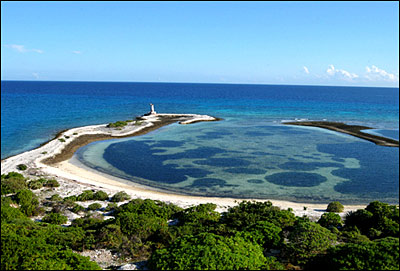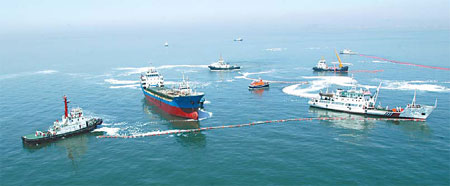Organized by China Maritime Safety Administration (MSA) and undertaken by the Shanghai Maritime Safety Administration, the Shanghai International Maritime Forum 2007 opens in the city on November 6.
The theme of this year's forum is "Global Concern on the Oil Transportation and Marine Environment Protection."

Senior officials from the International Maritime Organization (IMO), China's national and local MSAs and international experts in the field of oil pollution compensation, as well as representatives from shipping companies, insurance and emergency response companies, will attend the two-day forum, which closes tomorrow. They will discuss the following topics:
High-quality management of anti-pollution oil transportation,
The status quo and development of the implementation of international convention on anti-pollution measures,
Key problems and technologies of contingency management related to marine pollution,
The legal and technical issues concerning compensation for marine pollution damage.
China's achievements in marine environment protection and the problems it faces in the present scenario of rising maritime transportation, especially oil transportation, are the focuses of the forum.
Shanghai Maritime Safety Administration and local emergency response teams rescue a sinking ship near the city.
China, a big shipping nation, has more than 1 million oceangoing vessels, the ninth highest in the world, while the scale of its container fleet takes third place. It has 18,000 km of coastline, 110,000 km of inland navigable waters, vast sea areas and rivers crisscrossing the entire nation.
Marine environment protection has become an important basis for the sustainable social and economic development of the nation as well as the whole world.
Oil transportation
Oil import and transportation have experienced a surge in China in recent years, in keeping with the nation's rapid economic growth.
At present, China is the fifth largest oil producer and the second largest oil consumer in the world.
Last year, the nation's marine transportation volume for oil products reached 431 million tons and it is predicted that the volume will continue to rise in the years to come.
With the increasing number of oil shipping vessels plying in China, higher risks for marine environment pollution, especially oil spills, are predicted.
From 1973 to 2006, a total of 2,635 oil spill accidents occurred in China, including 69 serious ones, each with a spilling volume of more than 50 tons.
Under the coordination of the China Maritime Safety Administration, emergency response teams are engaged in an action to clean oil spill on the sea.
Marine environment pollution caused by oil spill accidents has been a major cause of concern for the Chinese government. During the past decades, the government has taken several measures to tackle the problem.
China's vessel pollution control efforts began in the early 1970s.
Since the implementation of the Marine Environment Protection Law of the People's Republic of China in 1982, a series of rules and regulations have been enacted in this field, offering a sound legal basis for marine environment protection.
China Maritime Safety Administration has played an important role in establishing a management mechanism for pollution control and prevention, improving anti-pollution rules and regulations, establishing an emergency mechanism and implementing the international conventions that the nation has signed.
China MSA has set up 14 local MSAs in the areas along the coast and the country's major navigable rivers.
International conventions
China has joined most of the international maritime conventions, among which the most important is the International Convention for the Prevention of Pollution from Ships, 1973, as Modified by the Protocol of 1978 (MARPOL 73/78).
On behalf of the Chinese government, the China MSA has actively participated in the drafting and revision of international conventions in the framework of IMO.
This year, China MSA has signed a memorandum of understanding with the IMO and International Petroleum Industry Environmental Conservation Association (IPIECA) to improve its emergency response ability against oil spills and effectively protect marine and coastal resources under the risk of oil spill.
It has also participated in the Western Pacific Action Plan by signing agreements on oil spill prevention with its counterparts in Japan, Russia and the Republic of Korean. Under the action plan, the China MSA is now planning a joint oil spill emergency response drill with its overseas partners, in Qingdao in Shandong in 2008.
In addition, China MSA has drafted a series of regulations to establish a coordination mechanism to tackle oil spill accidents occurring within the territory of China.
The national laws and rules, along with international conventions, have jointly formed a legislative basis for China's vessel-related marine environment management.
These efforts demonstrate the Chinese government's commitment and contribution to the protection of the global marine environment.
Other efforts
Other efforts made by the national and local MSAs in marine environment protection include enhancing investment in related facilities, launching training and drills targeting oil spills, and proposing an oil pollution compensation mechanism.
In recent years, the national and local MSAs have strengthened investment in the construction of infrastructure facilities, including a nationwide information system.
To date, 73 automatic identification system (AIS) stations have been built, aiming to form a wide-ranged AIS network to cover the country's near seas.
The MSAs have also upgraded the navigation marks in the nation's seaports and near sea areas to ensure the safety of vessels.
A CCTV (closed-circuit TV) network has also been established for the country's key sea navigation areas, such as the Yangtze River Estuary, the Zhoushan Isle area and the Pearl River Estuary.
Since China MSA opened the first training session for international oil pollution emergency response in 1982, China's MSAs have launched training relating to prevention of pollution from ships each year in the country's major seaport areas. International organizations like IMO have also cooperated in some of the training programs. In addition, the national MSA has sent several delegations to receive training in North America, Europe, Japan and Singapore.
China MSA has organized five large-scale marine rescue and oil spill emergency response drills in the sea areas near Shenzhen, Shanghai, Qingdao and Hainan in the past decades. These drills have helped the nation train a strong force in marine rescue and oil spill cleaning.
The most recent large-scale drill targeting oil spill emergency response was carried out in the Bohai Bay area near Qinhuangdao in Hebei Province. Employing the latest oil spill identifying, monitoring and cleaning equipment, as well as 24 vessels and two helicopters, the drill displayed the nation's latest technologies and strong capacity in tackling oil spill accidents.
During the second session of the Shanghai International Maritime Forum held in 2005, China proposed a plan to establish an oil spill compensation mechanism. At present, China MSA is cooperating with related institutions to draft the detailed regulations in this respect.
Under the mechanism, all ships plying the nation's seawaters are expected to buy insurance and set up a fund to contribute to the huge amount needed to clean oil leaks. Also, major oil wharfs will be required to have facilities to deal with oil spill emergencies.
(China Daily November 7, 2007)








